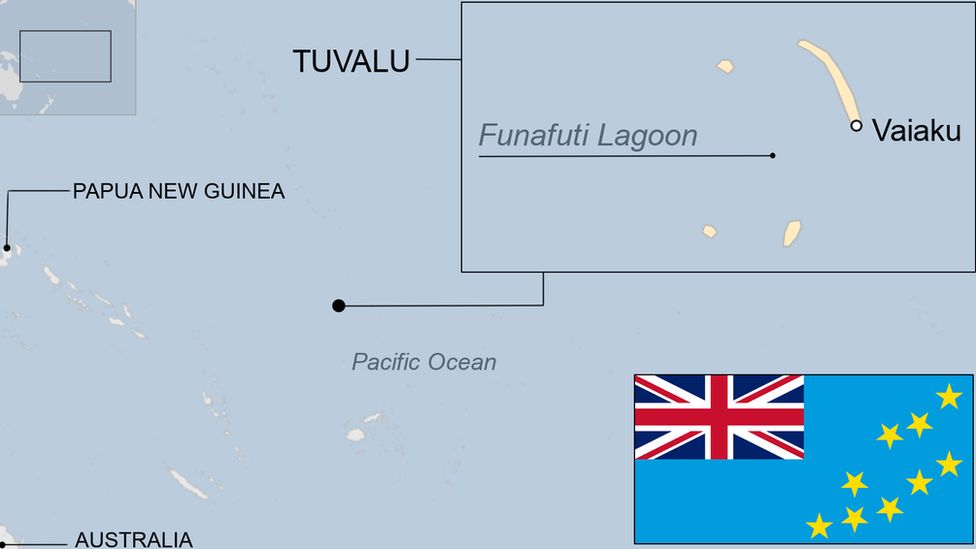Tuvalu country profile
- Published

Tuvalu is a group of nine tiny islands in the South Pacific which won independence from the United Kingdom in 1978.
Five of the islands are coral atolls, the other four consist of land rising from the sea bed.
Formerly known as the Ellice Islands, all are low-lying, with no point on Tuvalu being higher than 4.5m above sea level. Local politicians have campaigned against climate change, arguing that it could see the islands swamped by rising sea levels.
Life on the islands is simple and often harsh. There are no streams or rivers, so the collection of rain is essential.
Coconut palms cover most of the islands, and copra - dried coconut kernel - is practically the only export commodity. Increasing salination of the soil threatens traditional subsistence farming.
Tuvalu has shown ingenuity by exploiting another source of income. It has sold its .tv internet suffix to a Californian company for several million dollars a year in continuing revenue. The company sells the suffix on to television broadcasters.
- Read more country profiles - Profiles by BBC Monitoring
TUVALU: FACTS
- Capital: Funafuti
- Population: 11,500
- Area: 26 sq km
- Languages: Tuvaluan, English
- Life expectancy: 62 years (men) 67 years (women)
LEADERS
Head of state: King Charles III, represented by a governor-general
Prime Minister: Feleti Teo
Feleti Teo was appointed prime minister following the January 2024 general elections. He succeeded Kausea Natano, who Former Prime Minister Kausea Natano lost his seat in an election which was closely watched by Taiwan, China, US and Australia amid a geopolitical tussle for influence in the South Pacific.
Tuvalu is one of Taiwan's few remaining Pacific allies. Nauru cut ties in January 2024 with Taiwan and switched to Beijing, which had promised more development help.
Teo, who was educated in New Zealand and Australia, was Tuvalu's first attorney general. He has decades of experience as a senior official in the regional fisheries organisation and has worked with the Pacific Islands Forum, the region's major political and economic group. Fishing is a major source of revenue in the Pacific islands.
Tuvalu has no political parties. Allegiances revolve around personalities and geography. The 15-member parliament is popularly elected every four years. The prime minister is chosen by MPs.
MEDIA
Media freedom is respected in Tuvalu but the market is very small. The government operates Radio Tuvalu. Many islanders use satellite dishes to watch foreign TV stations.
TIMELINE
Some key dates in Tuvalu's history:
14th century AD - Samoans, Tongans and settlers from other Polynesian islands migrate to the islands
1568 and 1595 - Spaniard Alvaro Mendana de Neyra sights the islands of Nui and Niulakita on two separate expeditions.
1819 - A ship owned by British MP Edward Ellice visits Funafuta. The captain names the island Ellice Island. Later this name was applied to all nine atolls.
1850-75 - "Blackbirding" - the kidnapping of islanders for forced labour on plantations in Fiji and Queensland - and the introduction of European diseases reduces the population from 20,000 to 3,000. In 1863 Peruvian slave traders kidnap 400 islanders - nearly two-thirds of the population of the islands of Funafuti and Nukulaelae.
1877 - Britain sets up the Western Pacific High Commission with its headquarters in Fiji. The Ellice Islands and other island groups come under its jurisdiction.
1892 - Britain declares a joint protectorate over the Ellice Islands and the Gilbert Islands.
1916 -The Gilbert and Ellice Islands Colony is formed. Over the next 20 years other island groups, including the Line Islands and the Phoenix Islands, join the colony.
1974 - Ethnic tensions result in more than 90% of the mainly Polynesian Ellice Islanders voting for separation from the predominantly Micronesian Gilbert Islands.
1975 - Ellice Islands become a separate British dependency, under the pre-colonial name of Tuvalu meaning "eight standing together" which refers to the eight populated atolls.
1978 - Tuvalu becomes independent - the Gilbert Islands become independent at the same time as Kiribati.
1986 - Votes to remain an independent constitutional monarchy with the British monarch at its head.
1989 - UN lists Tuvalu as one of a number of island groups most likely to disappear beneath the sea in the 21st Century because of global warming.
2000 - Tuvalu joins the United Nations.
2001 - New Zealand offers to resettle islanders threatened by rising sea-levels. Tuvalu says it will take legal action, along with Kiribati and the Maldives, against the US for its refusal to sign the Kyoto Protocol, an international agreement to cut greenhouse gas emissions.
2008 - Tuvalu again votes to remain an independent constitutional monarchy with the British monarch at its head, though the referendum turnout is low - 21%.
2022 - Amid rivalry between China and Taiwan for diplomatic recognition from Pacific states, Tuvalu's Prime Minister Kausea Natano reaffirms its commitment to Taiwan on a state visit to Taipei.
Tuvalu announces plans as the first country in the world to build a self-digital replica in the metaverse in order to preserve its cultural heritage in the face of rising sea levels.
2023 - Prime Minister Natano signs Falepili Union treaty with Australia that will allow Tuvaluan citizens facing displacement from climate change to immigrate to Australia. In exchange, the agreement allows Australia veto power over Tuvalu's foreign security agreements.
Related Topics
- Published27 October 2023
- Published27 October 2023
- Published26 January
- Published30 October 2023
- Published27 October 2023
- Published23 August 2023
- Published27 October 2023